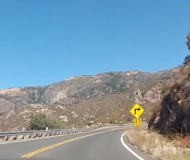11/19/2019
California Court Upholds Warrantless GoPro SeizureCalifornia Court of Appeal upholds taking the GoPro from a car involved in an accident.

California cops may grab your dashcam video without first obtaining a warrant under a state Court of Appeal ruling published last week. A three-judge panel considered the case of motorist Robert Kien Tran, 39, who was driving his Volkswagen Golf on Palomar Mountain Road on November 6, 2016. This twisty route in San Diego County is a favorite for motorcyclists and car enthusiasts, so Tran had GoPro cameras recording his ascent from both the front and rear of the Golf.
Motorcyclist Pablo Vargas was headed down the mountain road in the other direction when the Golf lost control and drifted over the double yellow line into his lane. Vargas was hit, suffering near-fatal injuries requiring an airlift to a trauma center. Although the motorcyclist survived, he lost the use of his left arm.
A witness to the incident noticed that Tran removed the cameras from his car after the accident. California Highway Patrol Sergeant Brad Palmer responded to the scene and asked Tran whether he had those cameras. Tran said he had one in his backpack.
"I needed to get that dashboard camera because it had evidence, and I was concerned with the little SD cards that could be in it," Officer Palmer testified. "It could be destroyed by putting your fingers in your pockets. It could be chucked. It could be stepped on."
The officer asked Tran to take out the camera, but Tran hesitated and asked if he had the authority to take it. The officer threatened him with a charge of obstruction if he refused. Officer Palmer took the cameras, but he gave it to another officer and said to obtain a warrant before viewing the footage. That warrant was issued three days later.
Tran challenged the warrantless seizure of his camera as a Fourth Amendment violation, claiming there were no exigent circumstances nor even probable cause of a crime that would require the immediate taking of his property. The Court of Appeal strongly disagreed.
"Based on the evidence proffered at the suppression hearing, it appears that Tran was traveling too fast in his car when he came to a sharp right turn, drifted into oncoming traffic, and struck a motorcycle traveling the opposite direction," Justice Richard D. Huffman wrote for the appellate panel. "We struggle to contemplate how this evidence would not lead Palmer to believe Tran had driven recklessly."
The court pointed out that a seizure is less intrusive than a search, citing cases in which containers were seized from a crime scene but not opened until after a warrant is issued.
"Here the data from Tran's dashboard camera was not viewed or downloaded until after a warrant was obtained," Judge Huffman wrote. "Moreover, Tran had possession of the camera, and Palmer expressed concern that he could destroy the camera or the SD card from the camera... Palmer's experience with high-performance vehicles containing dashboard cameras was that the drivers use the cameras to record their driving."
The appellate court found that taking the camera was justified to preserve the potential evidence. Tran was sentenced in his previous trial to thirty days in jail for reckless driving.
A copy of the ruling is available in a 150k PDF file at the source link below.


